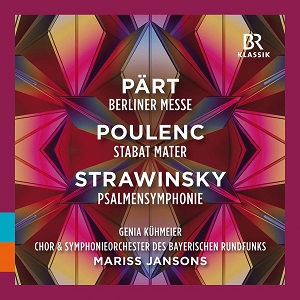
Francis Poulenc (1899-1963)
Stabat Mater (1950)
Igor Stravinsky (1882-1971)
Symphony of Psalms (1930)
Arvo Pärt (b. 1935)
Berlin Mass (1990)
Genia Kühmeier (soprano, Stabat Mater), Bavarian Radio Orchestra and Chorus / Mariss Jansons
rec. live 2-3 June 2005 (Pärt) & 8-9 November 2007 (Poulenc), Philharmonie im Gasteig, 5-6 March 2009 (Stravinsky), Herkulessaal der Residenz, Munich, Germany
BR KLASSIK 900201 [78]
Three major 20th-century works make for an imaginative programme. A little oddly, the release gathers performances recorded live fourteen to eighteen years ago.
Arvo Pärt composed the Berlin Mass for German Catholic Day. I became immersed in his music about thirty years ago. Returning to this major work after a long interval, I am still moved by its simplicity and authenticity. As an obvious comparison, his contemporary John Tavener’s music often gives me an impression of artificiality (I would not go so far as to call it bogus, as one critic did many years ago). My performance comparison is the spare, less romantic and less sophisticated 1993 interpretation by the Estonian Philharmonic Chamber Choir and Tallinn Chamber Orchestra under Tõnu Kaljuste on ECM. I find it more faithful to the essential purity of Pärt’s style. Jansons and his more “symphonic” forces give the impression of a rather upholstered performance.
Francis Poulenc composed Stabat Mater after the premature death of his friend Christian Bérard and after returning to the shrine of the Black Virgin of Rocamadour. For the most part, the work shows the serious side of the composer’s Janus-like temperament. This may seem obvious for a religious work, but is not inevitable if we recall the irreverence of Poulenc’s Gloria. Stabat Mater accommodates lighter, even radiant contrast. This is an impressive performance, but Jansons tended by nature to be a rather self-effacing conductor, who faithfully realised the score in objective, unadulterated form. While refreshing, this seldom proves revelatory. Without wishing to belittle this distinguished musician’s reputation, I generally find his performances beautifully executed, polished, well-rehearsed, natural and respectful, but short on individuality and strong, memorable characterisation. Few of his recordings would be in my essential collection. He does generate considerable fire here in Quis est homo, and again in Inflammatus et accensus. Poulenc includes a solo soprano in Vidit suum. Genia Kühmeier sings it beautifully, and is outstanding in Fac ut portem and in the final Quando corpus.
My too-general account of Jansons’s musical persona talks of objectivity. The near-opposite applies to his reading of Igor Stravinsky’s Symphony of Psalms. He often elicits sounds too warmly romantic for my taste; a more incisive (intellectual?) and less sensuous approach would work better. While not devoid of expressiveness, the music should, I believe, tend towards the statuesque, with a degree of detachment and austerity. (Stravinsky marks “espressivo” at Figure 7 in the first movement and “cantabile” is common in the instrumental parts, but dry staccato indications are much more frequent throughout the piece.) A random example: the 1947 recording by Ernest Ansermet and L’Orchestre de la Suisse Romande sounds to me thoroughly idiomatic and Stravinskian. The present performance does not sit as comfortably with me.
The Munich orchestra and chorus are first-class, though to be super-critical I have to say that the justly renowned choir is not completely unanimous in two or three of its entries. This does not disturb me, but I feel duty-bound to mention such very minor quibbles.
The booklet has Wolfgang Stähr’s excellent notes and texts in Latin, German and English. The recording venues and engineering are well-matched with Jansons’s interpretations.
Philip Borg-Wheeler
Help us financially by purchasing from





















